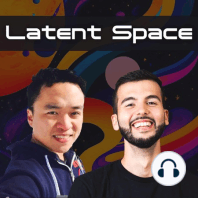70 min listen

The Point of LangChain — with Harrison Chase of LangChain
The Point of LangChain — with Harrison Chase of LangChain
ratings:
Length:
61 minutes
Released:
Sep 6, 2023
Format:
Podcast episode
Description
As alluded to on the pod, LangChain has just launched LangChain Hub: “the go-to place for developers to discover new use cases and polished prompts.” It’s available to everyone with a LangSmith account, no invite code necessary. Check it out!In 2023, LangChain has speedrun the race from 2:00 to 4:00 to 7:00 Silicon Valley Time. From the back to back $10m Benchmark seed and (rumored) $20-25m Sequoia Series A in April, to back to back critiques of “LangChain is Pointless” and “The Problem with LangChain” in July, to teaching with Andrew Ng and keynoting at basically every AI conference this fall (including ours), it has been an extreme rollercoaster for Harrison and his growing team creating one of the most popular (>60k stars at time of writing) building blocks for AI Engineers.LangChain’s OriginsThe first commit to LangChain shows its humble origins as a light wrapper around Python’s formatter.format for prompt templating. But as Harrison tells the story, even his first experience with text-davinci-002 in early 2022 was focused on chatting with data from their internal company Notion and Slack, what is now known as Retrieval Augmented Generation (RAG). As the Generative AI meetup scene came to life post Stable Diffusion, Harrison saw a need for common abstractions for what people were building with text LLMs at the time:* LLM Math, aka Riley Goodside’s “You Can’t Do Math” REPL-in-the-loop (PR #8)* Self-Ask With Search, Ofir Press’ agent pattern (PR #9) (later ReAct, PR #24)* NatBot, Nat Friedman’s browser controlling agent (PR #18)* Adapters for OpenAI, Cohere, and HuggingFaceHubAll this was built and launched in a few days from Oct 16-25, 2022. Turning research ideas/exciting usecases into software quickly and often has been in the LangChain DNA from Day 1 and likely a big driver of LangChain’s success, to date amassing the largest community of AI Engineers and being the default launch framework for every big name from Nvidia to OpenAI:Dancing with GiantsBut AI Engineering is built atop of constantly moving tectonic shifts: * ChatGPT launched in November (“The Day the AGI Was Born”) and the API released in March. Before the ChatGPT API, OpenAI did not have a chat endpoint. In order to build a chatbot with history, you had to make sure to chain all messages and prompt for completion. LangChain made it easy to do that out of the box, which was a huge driver of usage. * Today, OpenAI has gone all-in on the chat API and is deprecating the old completions models, essentially baking in the chat pattern as the default way most engineers should interact with LLMs… and reducing (but not eliminating) the value of ConversationChains.* And there have been more updates since: Plugins released in API form as Functions in June (one of our top pods ever… reducing but not eliminating the value of OutputParsers) and Finetuning in August (arguably reducing some need for Retrieval and Prompt tooling). With each update, OpenAI and other frontier model labs realign the roadmaps of this nascent industry, and Harrison credits the modular design of LangChain in staying relevant. LangChain has not been merely responsive either: LangChain added Agents in November, well before they became the hottest topic of the AI Summer, and now Agents feature as one of LangChain’s top two usecases. LangChain’s problem for podcasters and newcomers alike is its sheer scope - it is the world’s most complete AI framework, but it also has a sprawling surface area that is difficult to fully grasp or document in one sitting. This means it’s time for the trademark Latent Space move (ChatGPT, GPT4, Auto-GPT, and Code Interpreter Advanced Data Analysis GPT4.5): the executive summary!What is LangChain?As Harrison explains, LangChain is an open source framework for building context-aware reasoning applications, available in Python and JS/TS.It launched in Oct 2022 with the central value proposition of “composability”, aka the idea that every AI engineer will want to switch LLMs
Released:
Sep 6, 2023
Format:
Podcast episode
Titles in the series (66)
Building the AI × UX Scenius — with Linus Lee of Notion AI by Latent Space: The AI Engineer Podcast — Practitioners talking LLMs, CodeGen, Agents, Multimodality, AI UX, GPU Infra and all things Software 3.0